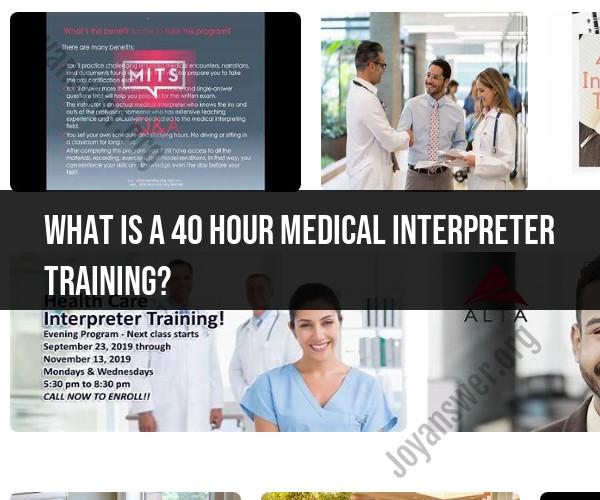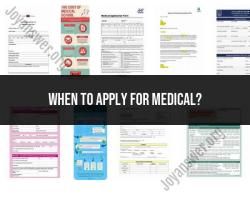What is a 40 hour medical interpreter training?
A 40-hour medical interpreter training program is a structured and comprehensive training designed to prepare individuals to work as professional medical interpreters in healthcare settings. Medical interpreters play a crucial role in facilitating effective communication between healthcare providers and patients who speak different languages or have limited English proficiency. Here's what you can expect from a typical 40-hour medical interpreter training program:
Curriculum: The training program covers a wide range of topics related to medical interpreting, including:
- Medical terminology and vocabulary in both English and the target language(s).
- Ethical principles and standards of practice for medical interpreters.
- Cultural competency and sensitivity in healthcare settings.
- Interpreter roles and responsibilities.
- Communication techniques and strategies.
- Anatomy and physiology basics.
- Healthcare procedures and protocols.
- Interpreting for specific medical specialties (e.g., cardiology, pediatrics, oncology).
- Legal considerations and patient confidentiality.
Language Proficiency: Participants should have a high level of proficiency in both English and the target language(s) they will be interpreting for. They must be able to accurately convey complex medical information.
Role-Playing and Practice: The training often includes role-playing scenarios where participants practice interpreting in mock healthcare situations. This helps develop practical skills and assess their ability to handle real-life encounters.
Code of Ethics: Emphasis is placed on understanding and adhering to a professional code of ethics for medical interpreters. This includes maintaining confidentiality, impartiality, and accuracy.
Certification: Some training programs are designed to prepare individuals for medical interpreter certification exams, such as those offered by organizations like the Certification Commission for Healthcare Interpreters (CCHI) or the National Board of Certification for Medical Interpreters (NBCMI). Certification can enhance job prospects and professional credibility.
Cultural Competency: Cultural competence training helps interpreters understand and navigate cultural differences and customs in healthcare interactions. This is crucial for effective communication and patient care.
Legal and Regulatory Compliance: Participants learn about relevant laws and regulations related to medical interpreting, such as the Health Insurance Portability and Accountability Act (HIPAA) in the United States. Understanding legal requirements is essential to protect patient privacy and ensure compliance.
Practical Skills Assessment: Many programs include assessments to evaluate participants' interpreting skills and their ability to meet the program's standards. This may include oral and written exams.
Continuing Education: After completing the initial 40-hour training, many interpreters continue their education through workshops, seminars, and ongoing professional development to stay updated on medical advancements and best practices.
It's important to note that medical interpreter training programs may vary in content and duration, but a 40-hour program is a common industry standard. Some programs are offered in-person, while others are available online, allowing flexibility for individuals who may be working or have other commitments.
Ultimately, successful completion of a 40-hour medical interpreter training program prepares individuals to provide crucial language support in healthcare settings, ensuring that patients receive quality care and understand their medical treatment options.
Understanding 40-Hour Medical Interpreter Training: What to Expect
40-hour medical interpreter training programs typically cover a variety of topics, including:
- Medical terminology: Students learn the basic medical terminology used in healthcare settings.
- Medical interpreting skills: Students learn how to interpret medical conversations accurately and fluently.
- Medical ethics and confidentiality: Students learn about the ethical and confidentiality standards that apply to medical interpreters.
- Cultural competency: Students learn about the cultural differences that may affect medical interpreting.
In addition to classroom instruction, 40-hour medical interpreter training programs typically include role-playing exercises and simulated medical encounters. This gives students the opportunity to practice their skills in a realistic setting.
The Value of 40-Hour Medical Interpreter Training Programs
40-hour medical interpreter training programs provide students with the essential knowledge and skills they need to begin a career in medical interpreting. These programs can help students to:
- Develop a strong understanding of medical terminology
- Learn the ethical and confidentiality standards that apply to medical interpreters
- Develop their medical interpreting skills
- Become more culturally competent
40-hour medical interpreter training programs can also help students to prepare for the national certification exams offered by the National Board of Certification for Medical Interpreters (NBCMI) and the Certification Commission for Healthcare Interpreters (CCHI).
Preparing for a Career in Medical Interpreting: Completing the 40-Hour Training
To succeed in a career in medical interpreting, it is important to be bilingual or multilingual. In addition, medical interpreters must have excellent communication skills and the ability to work under pressure.
To prepare for a career in medical interpreting, it is important to complete a 40-hour medical interpreter training program. These programs will provide you with the essential knowledge and skills you need to begin your career.
Once you have completed a 40-hour medical interpreter training program, you may want to consider becoming certified by the NBCMI or the CCHI. Certification demonstrates to potential employers that you have the skills and knowledge necessary to be a successful medical interpreter.
Additional tips for preparing for a career in medical interpreting:
- Volunteer or intern as a medical interpreter
- Network with other medical interpreters
- Stay up-to-date on medical terminology and healthcare trends
- Continue your education and professional development
By following these tips, you can increase your chances of success in a career in medical interpreting.












